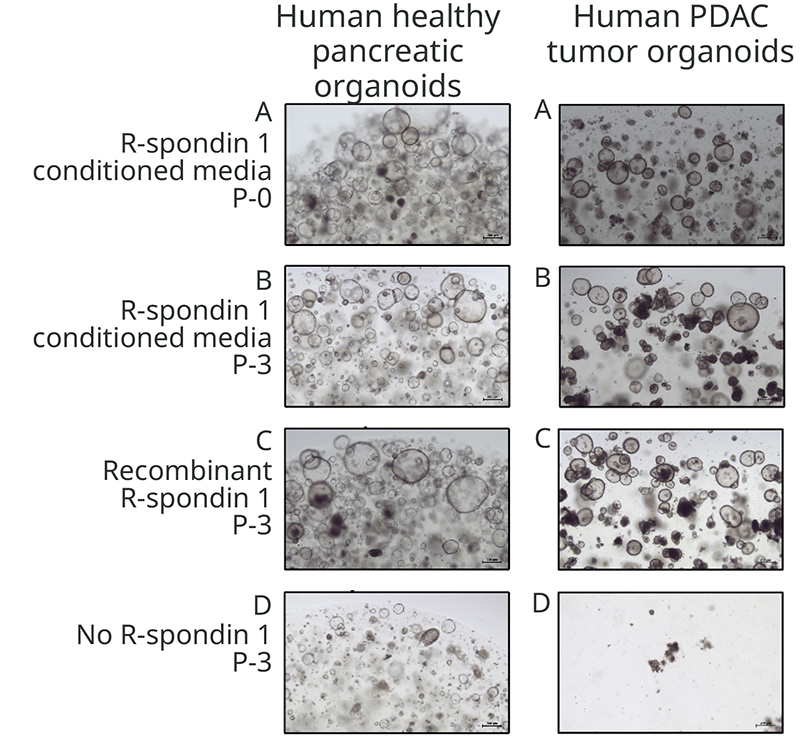Recombinant R-spondin 1 (Qk006) can replace conditioned media in pancreatic organoid culture
Experiments conducted by Dennis Plenker, Ph.D. in the lab of Dr. David Tuveson at Cold Spring Harbor Laboratory
Human R-spondin 1 protein (RSPO1) is the prototypic member of the R-spondin family. R-spondin 1 is used to potentiate Wnt signaling in many organoid culture systems.
Conditioned media from R-spondin 1 expressing cell lines is a common source of R-spondin 1. However, conditioned media is a major source of intra- and inter-lab variability. Recombinant proteins can provide a low variability alternative to conditioned media.
- Healthy human pancreatic organoids and pancreatic ductal adenocarcinoma (PDAC) organoids were cultured with either conditioned media or growth media supplemented with recombinant R-spondin 1 (Qk006).
- Organoid phenotype was maintained when R-spondin 1 conditioned media was replaced with recombinant R-spondin 1 protein.
Recombinant R-spondin 1 protein (Qk006) is comparable to conditioned media in supporting the growth of pancreatic organoids and PDAC tumor organoids. Qkine growth factors have high lot-to-lot consistency, reducing variability introduced by the use of conditioned media.
Experiments conducted by Dennis Plenker, Ph.D. in the lab of Dr. David Tuveson at Cold Spring Harbor Laboratory

Comparison between human healthy pancreatic organoids and human PDAC tumor organoids. Initial cultures maintained in full growth media supplemented with Wnt3a R-spondin 1 conditioned media (P-0, A). Cultures were then continued in R-spondin 1 conditioned media (B), growth media with 100 nM recombinant R-spondin 1 (Qk006, C), or growth media alone (D).
All our proteins are produced in our Cambridge, UK labs. We provide detailed quality data for each batch because we believe reliable, high-quality cytokines and growth factors are critical for successful stem cell and organoid culture.
When we test our proteins, we choose a vial at random and reconstitute as recommended to ensure we are testing as close to the protein you will receive as possible. Biochemical identity and purity is checked using SDS-PAGE, mass spectrometry and analytical reversed-phase chromatography. Bioactivity is determined using an appropriate cell-based assay. As stem cells are sensitive to endotoxin levels, we use a high resolution test to ensure endotoxin levels are at industry-leading low levels (<0.01 EU per µg protein). We also check that the correct amount of protein is recovered from the vial – it might sound basic, but if you order 100 µg, we believe you should receive 100 µg, so when you use the proteins you can rely on your calculated dilution.
Please contact us with questions any time by email at support@qkine.com or phone +44 (0) 1223 491486 / US toll free 1-866 877 2185.
